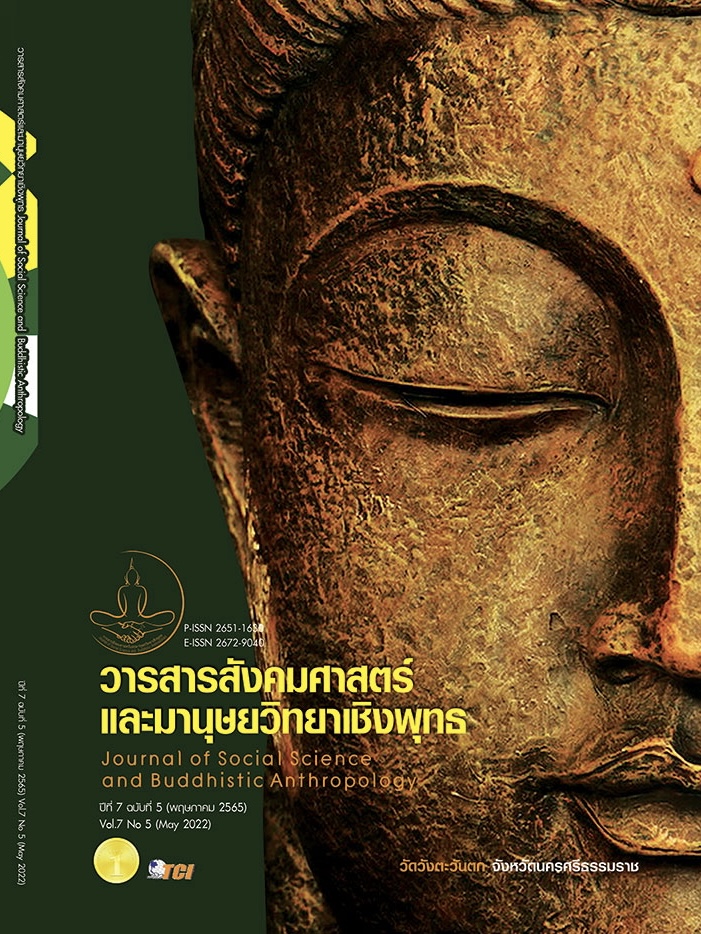THE MANAGEMENT OF GOVERNMENT AND PRIVATE SECTOR IN THE PROMOTION OF ENERGY INDUSTRIAL ESTATE FROM INDUSTRIAL WASTE IN THE SPECIAL ECONOMIC ZONE, SA KAEO PROVINCE
Keywords:
Cooperation Management, Government and Private sector, Energy Industrial Estate, Industrial WasteAbstract
The objectives of this research article were to 1) the role of the public and private sectors in promoting the development of electric power plant from industrial waste; 2) the management of public-private sector cooperation in promoting the development of electric power plant from industrial waste. It is a qualitative research. Data collected using an interview form by in-depth interviews with key informants; 6 government agencies, 2 private agencies, and 4 people's representatives, and 19 people, had group discussions with key informants. The data were analyzed by the content analysis method. The roles of government and private sectors in promoting the development of electric power plant from industrial waste consist of: 1) the role of promoting, It is a role in arranging personnel who have knowledge and expertise of the agency to help provide knowledge for understanding of the Environment 2) The Role of Cooperation and Participation, It is a role to participate in working together in planning, organizing meetings, organizing activities for community study trips, training and knowledge 3) The role of development as a role in cooperation participation and support of agencies in all sectors for guidelines for cooperation between the public and private sectors. For the management of cooperation to achieve the development, processes of guideline as follow, 1) Planning, project plan should have the characteristics of a development plan which represent as participatory planning. 2) Organization, group work or departments should be arranged according to the function or the expertise. Job description and responsibility should easy to understand and clear. 3) Commanding, scope the authority and assignment of tasks to control the achievement over operations. 4) Coordination, facilitate any coordination, communication, and information. 5) Control, supervision the management of project action plans, and the Industry standard.
References
กรมโรงงานอุตสาหกรรม. (2563). มาตรฐานความรับผิดชอบต่อสังคมของผู้ประกอบการ: CSR-DIW. กรุงเทพมหานคร: บริษัท พญาพริ้นติ้งแอนด์พับลิชชิ่ง จำกัด.
การนิคมอุตสาหกรรมแห่งประเทศไทย. (2562). โครงการนิคมอุตสาหกรรมในพื้นที่เขตพัฒนาเศรษฐกิจพิเศษจังหวัดสระแก้ว (รายงานผลการปฏิบัติตามมาตรการด้านสิ่งแวดล้อม นิคมอุตสาหกรรมในพื้นที่เขตพัฒนาเศรษฐกิจพิเศษจังหวัดสระแก้ว). เรียกใช้เมื่อ 2 เมษายน 2564 จาก https://eia.onep.go.th/images/monitor/1580469308.pdf
ณัฐวุฒิ ดุษฎี และคณะ. (2559). ความเหมาะสมและวิเคราะห์โครงการแปรรูปขยะมูลฝอยเป็นพลังงานทดแทนในรูปแบบของ RDF. เรียกใช้เมื่อ 3 เมษายน เมษายน 2564 จาก https://erp.mju.ac.th/researchDetailPublic.aspx?rid=5089
พภัสสรณ์ วรภัทร์ถิระกุล. (2561). ภาวะผู้นำและการมีส่วนร่วมของประชาชนที่มีผลต่อความสำเร็จในการบริหารจัดการปัญหาขยะมูลฝอยในท้องถิ่น: กรณีศึกษา เทศบาลเมืองจังหวัดปทุมธานี. วารสารคุรุศาสตร์ มหาวิทยาลัยราชภัฏมหาสารคาม, 15(2), 491-500.
ศูนย์ส่งเสริมอุตสาหกรรมภาคที่ 11. (2565). ทำไมต้องลงทุนในเขตพัฒนาเศรษฐกิจพิเศษ. เรียกใช้เมื่อ 1 กุมภาพันธ์ 2565 จาก http://www.songkhladopa.go.th/economy /content/cate/3
สถาบันพลังงานเพื่ออุตสาหกรรม สภาอุตสาหกรรมแห่งประเทศไทย. (2562). โครงการส่งเสริมการอนุรักษ์พลังงานและพลังงานทดแทนสำหรับผู้ประกอบการด้วย
บริษัทจัดการพลังงาน (ESCO 2562). เรียกใช้เมื่อ 2 กุมภาพันธ์ 2565 จาก https://iie.fti.or.th/?p=4384
สำนักงานคณะกรรมการพัฒนาการเศรษฐกิจและสังคมแห่งชาติ. (2559). แผนพัฒนาเศรษฐกิจและสังคมแห่งชาติฉบับที่ 12 (พ.ศ. 2560 - 2564). กรุงเทพมหานคร: สำนักงานคณะกรรมการพัฒนาการเศรษฐกิจและสังคมแห่งชาติ สำนักนายกรัฐมนตรี.
สำนักงานจังหวัดสระแก้ว. (2563). แบบรายงานผลการประชุมทบทวนแผนยุทธศาสตร์การพัฒนาอุตสาหกรรมจังหวัดประจำปีงบประมาณ พ.ศ. 2563. เรียกใช้เมื่อ 2 เมษายน 2564 จาก http://old.industry.go.th/sakaeo/index.php/2020-02-12-09-20-02/2020-02-12-09-43-47/2020-02-12-09-44-55/22393-2563-5/file
สำนักงานนโยบายและแผนทรัพยากรธรรมชาติและสิ่งแวดล้อม. (2563). การประเมินผลกระทบสิ่งแวดล้อม. เรียกใช้เมื่อ 3 เมษายน 2564 จาก https://eia.onep.go.th/services /web//doc/download-monitor?id=18626
สำนักงานปลัดกระทรวงอุตสาหกรรม. (2562). แผนปฏิบัติราชการรายปี พ.ศ. 2563 ของกระทรวงอุตสาหกรรม. เรียกใช้เมื่อ 2 กุมภาพันธ์ 2565 จาก https://psd.industry.go.th/web-upload/migrated/files/2016_psd/document _download_645b2c83-d677-44a3-b654-a61891c8fd28_18_article_file.pdf
Adelle, C. et al. (2018). Environmental instruments in development cooperation: promoting better development and environmental outcomes? In European Union External Environmental Policy (pp. 81-101). Palgrave Macmillan, Cham.
Cohen, L. et al. (2015). Research Methods in Education 5thed. London: Routledge/Falmer, Taylor&Francis Group.
Epstein, R. M. et al. (2017). Effect of a patient-centered communication intervention on oncologist-patient communication, quality of life, and health care utilization in advanced cancer: the VOICE randomized clinical trial. JAMA oncology, 3(1), 92-100.
Harangozó, G. & Zilahy, G. (2015). Cooperation between business and non-governmental organizations to promote sustainable development. Journal of Cleaner Production, 89 (1), 18-31.
Hoque, A. S. M. M. (2018). Does government support policy moderate the relationship between entrepreneurial orientation and Bangladeshi SME performance? A SEM approach. International Journal of Business Economics and Management Studies, 6(3), 37-59.
Li, X., Sun, S. & Xia, C. (2019). Reputation-based adaptive adjustment of link weight among individuals promotes the cooperation in spatial social dilemmas. Applied Mathematics and Computation, 361(1), 810-820.
Moullin, J. C. et al. (2019). Systematic review of the exploration, preparation, implementation, sustainment (EPIS) framework. Implementation Science, 14(1), 1-16.
Peters, B. G. (2018). American public policy: Promise and performance. Retrieved February 2, 2022, from https://www.amazon.com/American-Public-Policy-Promise-Performance/dp/1506399584
Rajaeifar, M. A. et al. (2017). Electricity generation and GHG emission reduction potentials through different municipal solid waste management technologies: a comparative review. Renewable and Sustainable Energy Reviews, 79(11), 414-439.
Sadick, M. A. et al. (2019). The Role of Development Oriented Non-Governmental Organizations in Creating Shared Value in the Educational Sector of Ghana: The Mediating Role of Basic Needs. VOLUNTAS: International Journal of Voluntary and Nonprofit Organizations, 30(6), 1297-1318.
Shams, S. et al. (2017). Sustainable waste management policy in Bangladesh for reduction of greenhouse gases. Sustainable cities and society, 33(8), 18-26.
Vertakova, Y. V. (2019). The integrated approach to sustainable development: the case of energy efficiency and solid waste management. International Journal of Energy Economics and Policy, 9(4), 194-201.
Downloads
Published
How to Cite
Issue
Section
License
Copyright (c) 2022 Journal of Social Science and Buddhistic Anthropology

This work is licensed under a Creative Commons Attribution-NonCommercial-NoDerivatives 4.0 International License.









